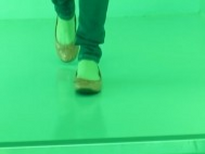Evie

(Text only clips) Evie has had eczema since she was 6 months old. She also developed acne when she was 15, but grew out of it as she got older. Evie finds that others often do not fully understand the effect of eczema on everyday life.
Evie, aged 20, is a university student. She also works as a part-time customer assistant. Her ethnicity is White British.
More about me...
Evie has had eczema since she was six months old. Her eczema is mostly on her hands and feet (also known as “socks and gloves”) with some patches on her legs and arms. She finds the eczema on her hands particularly difficult to treat because they are exposed to many drying factors throughout the day. Evie’s triggers include tree nuts, cats/dogs, dust mites, stress, and changes in temperature (e.g. summer heat or air-conditioning). Evie also had acne between the ages of 15 and 17. Acne runs in her family and she initially waited 6 months before seeing a GP. She took antibiotic tablets for a year but found they did not help much. With regular exercise and a healthier diet, Evie’s acne eventually cleared up.
With regards to treatment for Evie’s eczema, she initially consulted GPs before receiving her first dermatology referral at the age of 6. She finds it positive that there are often medical students also present at her current dermatology clinic, as this gives her an opportunity to inform them about the experiences of living with eczema. Her current treatment routine consists of using several moisturising creams, steroids and antihistamine tablets. The only side effect that she has experienced is skin thinning with steroid use. Evie is considering UV light therapy as a potential treatment for her eczema in the future. She also notes that paying for prescriptions is an expensive investment.
Evie keeps herself busy with her studies, a part-time job and various hobbies in order to distract herself from the itchiness of her skin and avoid the temptation to scratch. To prevent scratching in her sleep, she protects her hands with tubular bandages. She follows eczema-related Facebook groups and Twitter accounts, often giving advice based on her own experiences, including to mothers of young children with eczema. Evie uses her university library access to research in medical journals about eczema. Evie experienced a flare-up while at university and suggests that it might be linked to a ‘seven year cycle’ theory (the idea that the status of eczema changes every seven years). She thinks though that this flare-up was probably due to a change in environment and increase in stress.
Evie’s advice to young people with eczema is to look up treatments online and keep a photo diary as evidence of what happens in between appointments with doctors. Evie also finds that the eczema-related Facebook groups and Twitter accounts are a good place for information and support. Evie’s advice to healthcare professionals treating young people with eczema is to recognise and address the effects that eczema has on everyday life.


